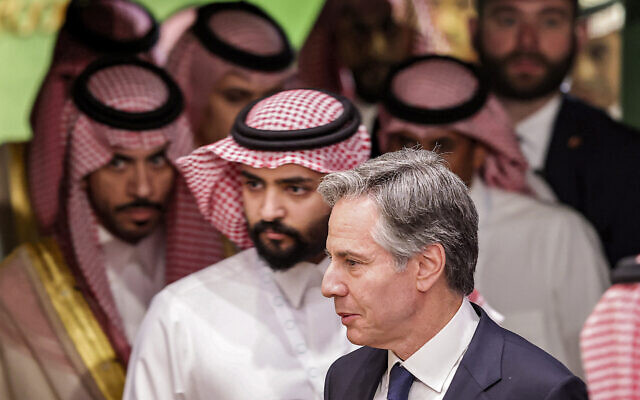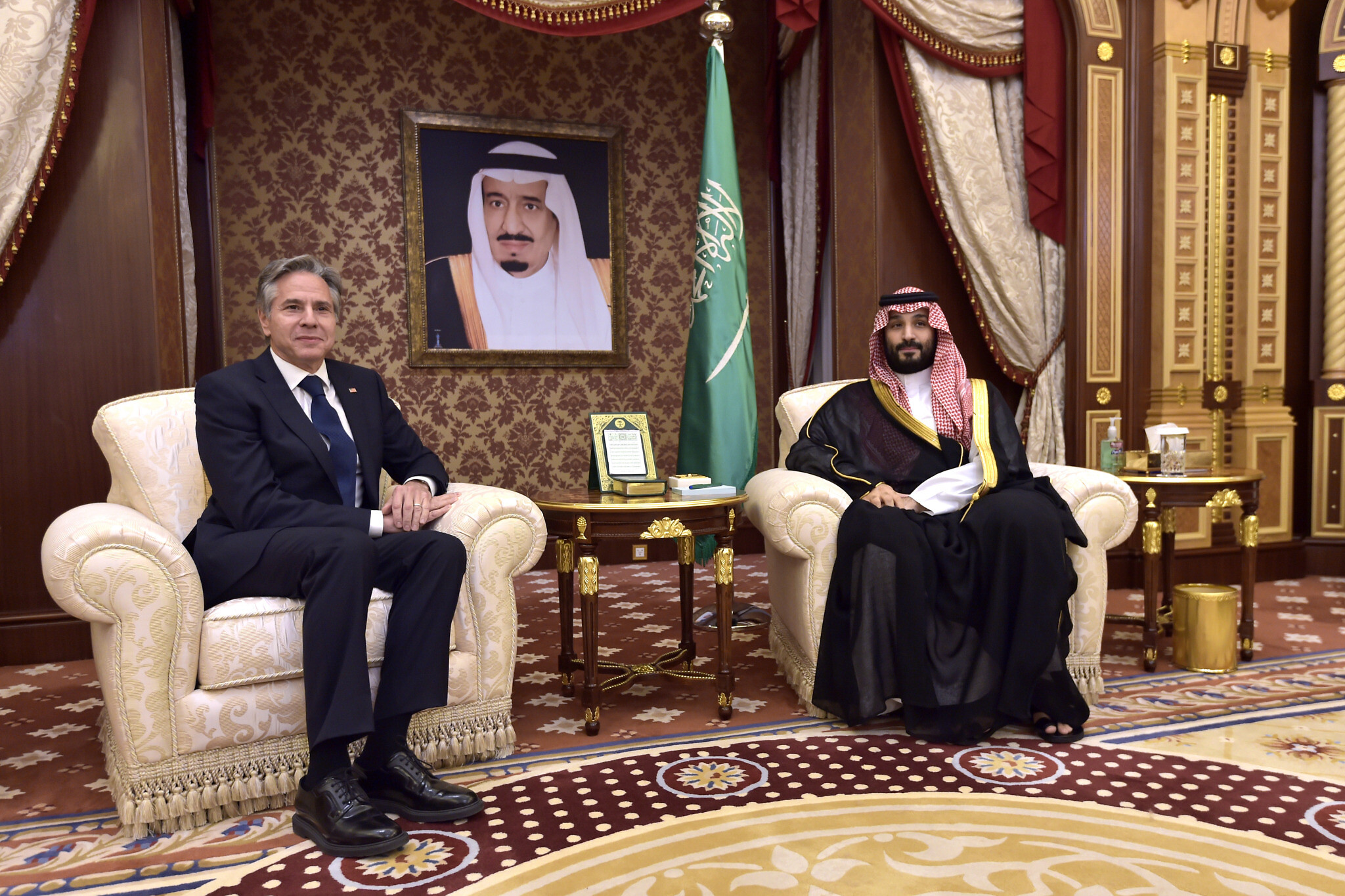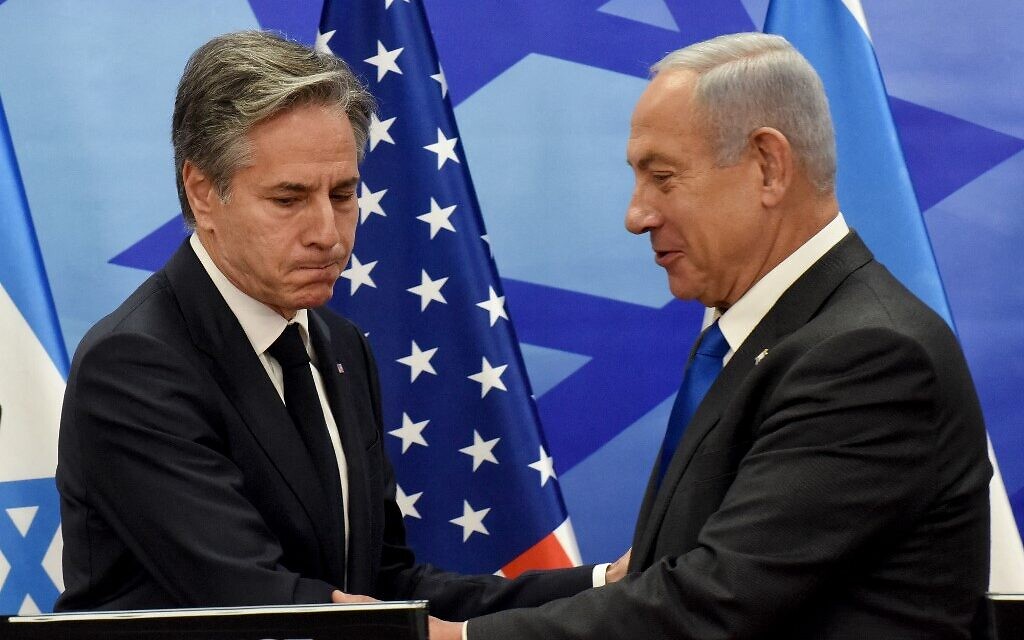US not optimistic on Israel-Saudi normalization despite boosting efforts — report
NY Times says Netanyahu recently held 40-minute call with Blinken on Saudi demands, while envoy McGurk led delegation to region last week

Washington does not view an Israeli-Saudi normalization deal as particularly likely, but has decided to ramp up efforts to reach one anyway, The New York Times reported Saturday.
The Times focused on growing efforts by the Biden administration to broker a deal in recent months, with US Secretary of State Antony Blinken and National Security Adviser Jake Sullivan closely involved and Washington engaged in frequent conversations with both sides.
US Mideast envoy Brett McGurk led a delegation to the region on the matter this week, it said. And Blinken, after visiting Riyadh earlier this month, held a 40-minute conversation with Prime Miniter Benjamin Netanyahu on the Saudi demands for an accord.
Still, the report cited several American officials who assessed the chances of a deal at less than 50 percent.
But “Biden has decided to go for it, and everyone in the administration now understands that the president wants this,” Martin Indyk, former US envoy to Israel, told the Times.
It noted that, as previously reported, Saudi Arabia has demanded that the US cooperate with the kingdom on uranium enrichment for civilian purposes. Other demands by Saudi Crown Prince Mohammed bin Salman are American guarantees to defend the country if it is attacked, and a removal of certain barriers on arms sales to the kingdom, according to two US officials cited by the paper.

The report said bin Salman understands he will need to give up the previous Saudi demand for a Palestinian state or significant peace negotiations prior to normalization and appears open to the matter, though he will likely want significant benefits for the Palestinians, which have not yet been named.
It noted that bin Salman’s main interest in normalizing with Israel would be the American concessions he could sell at home, where peace with the Jewish state would be broadly unpopular.
Netanyahu must also decide whether the price of giving an Israeli green light to Saudi enrichment and concessions to the Palestinians — both matters for which he is likely to face significant blowback at home — is worth the prize of official relations with Riyadh, the paper said. Netanyahu’s current government with hard-right parties could make such compromises a tough sell, and could even endanger the survival of his coalition.
“Bibi wants this so badly he can taste it,” Indyk said, but any proposal that does not include serious gains for Palestinians would be a non-starter for the Saudis.
The Times noted that another hurdle for any deal would be the US Congress, where weapons sales to the Saudis and enrichment agreements would be hard to swallow, though Israeli backing, and the opportunity for greater Middle East stability and a stronger alliance in the face of Iran, could help push a deal over the finish line.

The question also remains as to whether the Saudi desire for enrichment is truly for civilian needs, or as a safeguard in case Iran does decide to develop a nuclear weapon, which would potentially enable Riyadh to do the same.
Israel has long opposed any nuclear development in the Gulf for fear of such a nuclear arms race.
Earlier this month, Saudi Foreign Minister Faisal bin Farhan said that Riyadh normalizing ties with Israel would bring significant benefits to the region but that those benefits would be limited by the absence of a two-state solution to the Israeli-Palestinian conflict.
Bin Farhan’s acknowledgment that normalizing ties with Israel would offer “significant benefits” appeared to stand out from previous comments.
Also this month, Netanyahu said in an interview that an Israeli normalization agreement with Saudi Arabia would be “a quantum leap forward” and “would change history” if it could be achieved, while saying such a deal was one of his primary policy goals in his latest term in office.
Speaking to Sky News, the premier said he could not guarantee that a deal will happen as “it’s up to the Saudis” but that he “certainly hope[s] so.”
Saudi Arabia, Netanyahu said, “is the most influential Arab country, not only in the Arab world — I think also in the Muslim world. It would fashion I think the possibility of ending the Arab-Israeli conflict, and I think that would also help us solve the Palestinian-Israeli conflict.”
Saudi officials have long said publicly that they won’t normalize relations with Israel before the establishment of a Palestinian state on the pre-1967 lines, even though they’ve offered more flexibility behind closed doors.
Jacob Magid contributed to this report.









